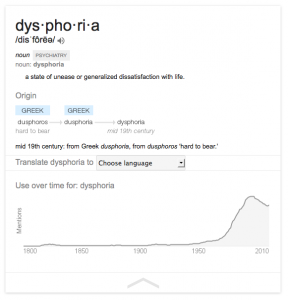I look up this and that on the Internets, and everywhere I read about bipolar disorder, manic depressive, obsessive compulsive, addiction, early Alzheimers, high-functioning Autistic, ADHD, etc… and I’m like “Yeah, that’s me!” but I know I’m not sick. I’m just me.
I read about mood swings and emotional collapse and heightened sensitivity and periods of rage and periods of unexplained sadness and not giving a shit but then suddenly giving a shit like my life depended on it. I read all this and I’m like “Yeah, I know!”
But there’s no way I am THAT clinical classification. Not me. I’m normal.
I once spoke at length with a clinical colleague about ADD/ADHD and “creative people”. She knew me only a little, but she knew how creative I was, and she knew how linear I was, when I wasn’t being “creative”.
And of course I was right there interacting with her for like 2 hours; a live specimen to be judged in real time. So I presume she had enough evidence to make her own (clinical) judgements.
“Creative people are just… different”, she taught me. Creative people don’t fit in, and once there is a miss fit, the “misfits” get revealed. And then the consequences of a misfit identified, take over. It’s what happens NEXT… that sets the stage for the future, and happiness (or not).
It’s how we HANDLE the missed fit and the labeling as “misfit” that matters.
She confessed that we “creative people” confuse her. She can’t understand how, if we are clearly so creative, we can’t seem to figure this part out. We can’t seem to understand that it is not the miss of the fit that matters, but our dealing with that miss fit label and the denial of our freedom of expression, that matters. How we deal with life is everything. If no one likes you. If everyone likes you. If you don’t like yourself. If you loooove yourself.And if you’re unsure.
And plenty of us deal with it poorly.
She is a counselor and life coach, and she helps people learn how to understand this, and deal with it better. Helps us to stay out of trouble, so to speak.
She teaches people how to recognize their oddness, and suggests that they not only recognize it for what it is (a benefit, not a handicap) but also celebrate it. But she suggests we try and do so within the rules of civil society.
She also hinted that there are plenty of ways to exercise our creative selves OUTSIDE of civil society, provided we are careful to make sure that what happens outside of civil society stays outside of civil society.
I wasn’t sure at that point if she was breaking the rules of clinical conduct or not. Actual, I was sure. The local board would not have been pleased.
Included in her advice was a subtle assertion that if you are unable or unwilling to constrain yourself to the bounds of your “society”, as required by whomever is “accusing” you of being very far out there, you may get branded as someone who possibly suffers from a mental illness. You may need to be “evaluated”.
And I project from that point, because I don’t remember the specifics of what she said vs. how I interpreted it, but I do remember quite well the way that I interpreted it:
For those wondering why all the fuss about their behavior, an “evaluation” is a determination if you will recognize the perceived seriousness of the problem associated with your “aberrant” behavior. Do you get that there will likely be consequences from continuing to not listen, or not comply beyond this formal and typically forced psychological evaluation. Basically it’s a wake-up call that says “hey, we want you to change your behavior, and if you don’t, we’re going to make you“.
For those asking for help, whether via carefully expressed words like “Can you help me please” or via actions like attempted suicide or violent outbursts to exhaustion, the “evaluation” is a moment of pause, restraint,and inquiry. The goal is to prevent further harm to yourself and others, while someone clinically qualified determines if you are in control or not, and to what degree, and basically just find out what’s going on.
The clinician can theoretically separate those in need of medical help from the rest of us, with that process. Medication? Check. Counseling? Check. Restraints? Check. Whatever is needed, can be arranged. As long as all parties are willing.
A good deal of the “coping with mental illness” advice for people who have loved ones with these various “treatable conditions” can be summarized into “be nicer to me”.
Try not to upset me. Try to understand me, and not overreact to my outbursts. Try to work with me, not against me. And try to understand I don’t mean to be difficult or mean or cause trouble, I just can’t help it sometimes.
I like that. People should be nice to me.
Be nice to me, not because I am mentally ill, and not because I am “creative”. Be nice to me because I am human, and we are all in this together. In exchange, I will refrain from breaking the rules of civilization, up to the point where those rules are fair and respectable. But if they are not, well, try to understand me.
